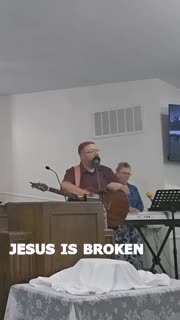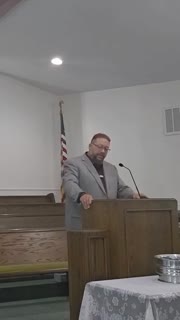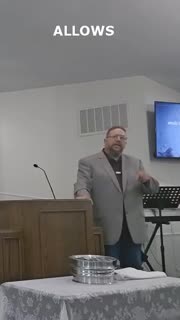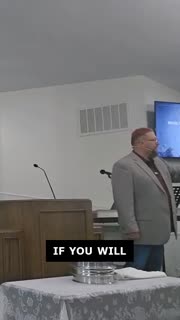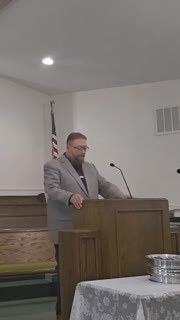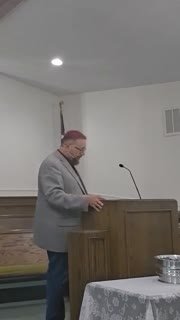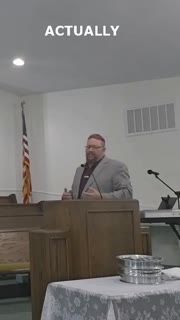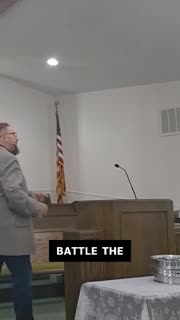Embracing Communion and Fasting for Spiritual Growth
Devotional
Sermon Summary
Bible Study Guide
Sermon Clips
### Quotes for outreach
1. "Jesus is broken body. Jesus is shed blood that encompasses our salvation and it also encompasses the hope of glory, the hope of a future, the hope that allows us to carry through this life as we look at his death, burial, resurrection and his promise that he will come again." [05:27] (23 seconds)
2. "Fasting is a temporary renunciation of something that in and of itself is good, like food, in order to intensify our expression of need for something greater, namely God and his work in our life." [38:16] (12 seconds)
3. "Fasting allows us to draw near to that place to be in a spot where we can subject our flesh and subject our appetites and subject our hunger to the spirit of God and say I want the Lord more than I want Job said in Job chapter 23 he said that I have desired the words of the Lord sustenance more than having food every day." [04:01] (31 seconds)
4. "If you will give up food for lunch one day this week and spend that time instead of eating worshiping and praying and reading your Bible God will meet you there and you can begin to grow in this." [07:03] (22 seconds)
5. "Fasting and prayer helps us battle the enemy fasting and prayer helps us battle temptation fasting is not prominent in the church today statistically most Christians have never fasted about 21% say that they have fasted and 79% never have maybe that's you today." [02:46] (33 seconds)
### Quotes for members
1. "We see three pictures here. We see Jesus celebrating Passover, the foreshadowing, the foreshadowing of what was to come in his death, his burial, his resurrection. We see him instituting the Lord's supper, which for us and from, for all of Christianity that came through Christ, from Christ until his return, we come to this table and we're not, we're not looking forward. We're looking backward." [04:02] (29 seconds)
2. "Fasting is the abstinence of consuming food. And in the Hebrew, the word for fast actually means to shut up your mouth to the point that you can't put anything in there. This is the idea of what an actual biblical fast is." [40:13] (20 seconds)
3. "Fasting is not a standalone activity. In other words if you fast and you separate fasting from worship and prayer and the word of God you are doing nothing but dieting. And hey there are physical health aspects to fasting. Studies have proven it that when you fast you reset your metabolism your body begins to work a little bit better." [56:36] (31 seconds)
4. "Jesus actually links the two at the end of prayer at the beginning of this passage of fasting. He says this word that we translate more over. Now more over you might just think of that as a word that might mean and. Except it's not the word that means and. We talked about the word that means and a couple of weeks ago as we were going through the Lord's Prayer. It's actually a word that means and also." [57:37] (30 seconds)
5. "Fasting and prayer helps us battle the enemy fasting and prayer helps us battle temptation fasting is not prominent in the church today statistically most Christians have never fasted about 21% say that they have fasted and 79% never have maybe that's you today I've never gone without eating for the purpose of drawing near to God for the purpose of subjecting my will to the spirit of God rather than to the appetites and desires that I may have." [02:46] (50 seconds)
Ask a question about this sermon
1. "Jesus is broken body. Jesus is shed blood that encompasses our salvation and it also encompasses the hope of glory, the hope of a future, the hope that allows us to carry through this life as we look at his death, burial, resurrection and his promise that he will come again." [05:27] (23 seconds)
2. "Fasting is a temporary renunciation of something that in and of itself is good, like food, in order to intensify our expression of need for something greater, namely God and his work in our life." [38:16] (12 seconds)
3. "Fasting allows us to draw near to that place to be in a spot where we can subject our flesh and subject our appetites and subject our hunger to the spirit of God and say I want the Lord more than I want Job said in Job chapter 23 he said that I have desired the words of the Lord sustenance more than having food every day." [04:01] (31 seconds)
4. "If you will give up food for lunch one day this week and spend that time instead of eating worshiping and praying and reading your Bible God will meet you there and you can begin to grow in this." [07:03] (22 seconds)
5. "Fasting and prayer helps us battle the enemy fasting and prayer helps us battle temptation fasting is not prominent in the church today statistically most Christians have never fasted about 21% say that they have fasted and 79% never have maybe that's you today." [02:46] (33 seconds)
### Quotes for members
1. "We see three pictures here. We see Jesus celebrating Passover, the foreshadowing, the foreshadowing of what was to come in his death, his burial, his resurrection. We see him instituting the Lord's supper, which for us and from, for all of Christianity that came through Christ, from Christ until his return, we come to this table and we're not, we're not looking forward. We're looking backward." [04:02] (29 seconds)
2. "Fasting is the abstinence of consuming food. And in the Hebrew, the word for fast actually means to shut up your mouth to the point that you can't put anything in there. This is the idea of what an actual biblical fast is." [40:13] (20 seconds)
3. "Fasting is not a standalone activity. In other words if you fast and you separate fasting from worship and prayer and the word of God you are doing nothing but dieting. And hey there are physical health aspects to fasting. Studies have proven it that when you fast you reset your metabolism your body begins to work a little bit better." [56:36] (31 seconds)
4. "Jesus actually links the two at the end of prayer at the beginning of this passage of fasting. He says this word that we translate more over. Now more over you might just think of that as a word that might mean and. Except it's not the word that means and. We talked about the word that means and a couple of weeks ago as we were going through the Lord's Prayer. It's actually a word that means and also." [57:37] (30 seconds)
5. "Fasting and prayer helps us battle the enemy fasting and prayer helps us battle temptation fasting is not prominent in the church today statistically most Christians have never fasted about 21% say that they have fasted and 79% never have maybe that's you today I've never gone without eating for the purpose of drawing near to God for the purpose of subjecting my will to the spirit of God rather than to the appetites and desires that I may have." [02:46] (50 seconds)
